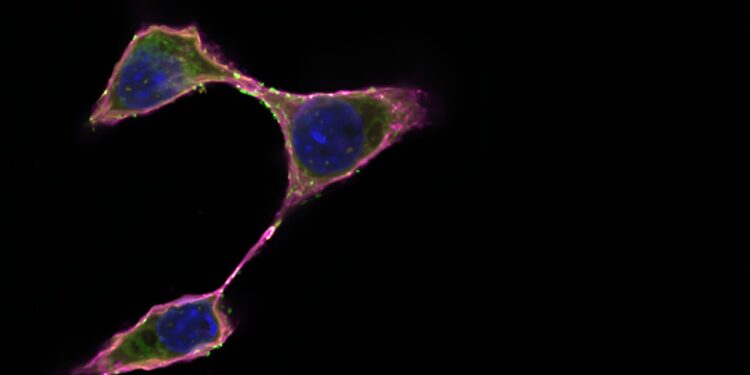Glycosphingolipids (in pink, via cholera toxin B) are so essential to cancer immune evasion that some cancer cells cannot proliferate without them. Credit: Rockefeller University
Cancer cells are rarely stealthy at first. Instead, they signal their presence to the immune system by implanting chemical warning signals directly on their membranes. Once alerted, the body’s defenses can step in and destroy the rogue cells before they can do significant damage. At the heart of this early-warning system are lipids, fatty compounds that cancer biologists once thought were a source of energy for growing tumors.
But now, a study published in Nature demonstrates that a particular type of lipid is actually essential for cancer immune evasion, so much so that some cancer cells cannot proliferate without it.
These results confirm long-held suspicions that not only is this lipid a key player in cancer biology (and therefore a key drug target), but also demonstrate that existing FDA-approved drugs designed to delay lipid production can galvanize the immune system against cancer.
“Cancer cells change the way these lipids are metabolized, which in turn distorts the ‘eat me’ signals that malignant cells usually produce,” says Mariluz Soula, first author of the study, a former graduate student in Kivanç Birsoy’s lab and now a scientist at Lime Therapeutics. “This gives a very different picture of the role lipids play in cancer growth.”
A mysterious link between lipids and cancer
Scientists have long known that cancer cells alter lipid metabolism, but it was traditionally thought that cancer cells took up these lipids for energy, consuming the fat molecules to help the tumor grow and spread far beyond that of healthy cells.
“We knew from the literature that high lipid levels correlated with the severity of cancer growth and metastasis, but we didn’t know exactly how,” Soula says. The Birsoy lab, in collaboration with the lab of Gabriel D. Victoria, set out to answer this question by looking at the genes involved in this process.
They then implanted a series of cancer cells, each lacking a different gene, into mice with and without immune systems, revealing which lipids cancer cannot survive without.
The result: so-called “sphingolipids.” Discovered in the late 1800s by German chemist Johann Ludwig Wilhelm Thudichum, sphingolipids are named after the mysterious Sphinx of Greek mythology, due to their mysterious structure and function.
Two centuries later, sphingolipids are less mysterious. “We know they’re not really used to produce energy,” Soula says. “They’re mainly present in the cell membrane to create a scaffold for signaling proteins.”
This discovery raised an interesting possibility. Is cancer cells’ lipid metabolism really just a result of hungry cells’ quest for more energy? Or is it a key part of cancer cells’ efforts to subtly manipulate cell signaling and evade the immune system?
Towards a new therapeutic strategy
To test how sphingolipids stimulate cancer growth, the team turned to an FDA-approved drug used to treat Gaucher disease, a genetic disorder characterized by a reduced ability to break down lipids. The drug essentially blocks the synthesis of glycosphingolipids, and the team found that this impairs tumor growth in models of pancreatic, lung, and colorectal cancer.
They also found that depleting glycosphingolipids prevented the formation of “lipid nanodomains” that cluster signaling molecules on the membrane, impacting cell surface receptors in a way that made them more susceptible to an immune response.
These results suggest that cancer cells store glycosphingolipids to mask inflammatory signals, and that disrupting glycosphingolipid production may make cancer cells vulnerable to the immune system.
“Everyone thought that high lipid levels were a source of energy for cancer cells,” Soula says. “We discovered that it’s much more complex. Lipids are not only a fuel, but also a protective mechanism for cancer cells that modulates how they communicate with the immune system.”
Further work will determine whether this phenomenon is true for multiple types of cancer. The team tested several types of cancer, but found that this mechanism was at work in cancers that are dependent on the KRAS gene (so named because of the mutated oncogene that causes them).
The initial results could nevertheless have significant clinical impact, given the aggressiveness of many KRAS-dependent cancers, such as pancreatic cancer. Based on their findings, the team suggests that drug and dietary interventions that slow sphingolipid production could help increase the effectiveness of existing immunotherapies.
“Diets can impact many aspects of cancer biology,” Birsoy says. “We think that modulating dietary lipids could be an interesting avenue to target the ability of cancer cells to evade immune cells.”
More information:
Mariluz Soula et al, Glycosphingolipid synthesis promotes immune evasion in KRAS-induced cancer, Nature (2024). DOI: 10.1038/s41586-024-07787-1
Provided by Rockefeller University
Quote:Cancer cells could use lipids to hide from the immune system (2024, September 9) retrieved September 9, 2024 from
This document is subject to copyright. Apart from any fair dealing for the purpose of private study or research, no part may be reproduced without written permission. The content is provided for informational purposes only.



